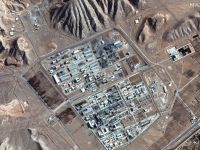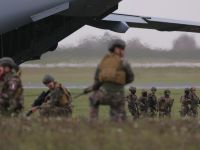By Munir K. Nasser
Washington, DC
A former US diplomat said the collapse of the Camp David summit was a “disappointment” because he was hoping for a breakthrough over the core issues.
Richard Murphy, former Assistant Secretary of State for Near Eastern and South Asian Affairs, told Albawaba.com in an interview that although Palestinian President Yasser Arafat never changed his position that Israel has to go back to the June 4 line, Israeli Prime Minister Ehud Barak showed more flexibility on the core issues.
Murphy said Barak moved on the question of the Old City of Jerusalem, “and that was unthinkable in Israeli politics.”
The following are excerpts from the interview:
Q- Was it a surprise to hear about the collapse of the Camp David summit?
A- It was a disappointment. The news control was so surprisingly absolute that we were all at the mercy of these little bits of encouragement or discouragement that have come out. The talks during the last 24 hours seemed to have a new tone of optimism.
Q- You were hoping that they might have a breakthrough and reach some sort of agreement?
A- Yes, I was. I understood from the things that was said and not said there has been movement on the issues of settlements, refugees, and borders, with exception of Jerusalem and the problem of the Old City. How could sovereignty be asserted or shared by both? Arafat never changed his position that Israel has to go back to the June 4 line.
Q- Who did show more flexibility in these talks, Barak or Arafat?
A-On the Old City, it looks as if Barak moved and Arafat didn’t. Two things lead me to say that: rumors that they were talking about Palestinian control over the Al-Aqsa and Dome of the Rock, and the Muslim Quarter and the Christian Quarter; that was unthinkable in Israeli politics. So Barak did move and he apparently had moved in Greater Jerusalem offering Palestinian suburbs of the City to the Palestinian state and moving in to the State of Israel Male Adumim and two other major settlements, possibly compensating with further land down in the Hebron area. We don’t know if any of this is factual, but that was the impression that was given.
Q- Could Arafat have been more flexible on some of the core issues?
A- He consistently said he wasn’t a free agent, not only because of Palestinian public opinion, but because of general Arab opinion on the Jerusalem issue. On the right of return, we don’t know what was said. We do hear that the Israelis offered a reunification of families, which could consist of up to a 100,000 according to media reports. Was there nay way that the Israelis could come to say ‘we accept the right of return for the Palestinians in principle, but that principle is subject to negotiations as far as its implementation goes?’ That is not just playing with words, but it is reality that Israel will never open its doors to 3.6 million Palestinians who wouldn’t want to go there anyway. But they have a right to return which would have been a valuable gesture to make in principle, and I don’t know if Barak moved on that. On Jerusalem, I don’t think Arafat was going to get support from the Arab world from leaders who would want to be quoted as saying ‘we told him to be lenient with the Israelis on Jerusalem’; nobody would tell him that.
Q- Why did both sides exclud reaching a partial settlement on the issues they agreed upon?
A- I think both must have felt it would be too risky to go back with a partial agreement. From Barak standpoint, he knew he would be asked painful things by the Israelis and he would say in exchange, “I have a full agreement including an end of the conflict”. In any case, from the Israeli side the length that Barak was willing to go certainly exceeded those of any predecessor. His critics in Israel are going to say, “you gave away the store, and you got nothing; and don’t just repeat to us that there is no full agreement unless everything is agreed. Because the Palestinians are going to hold you to what you said in Camp David,” and that will be the starting point in the next round.
Q- How this failure is going to reflect on President Clinton’s legacy as he was hoping to achieve a breakthrough in this conflict?
A- Certainly he was hoping to achieve it. His legacy will be written in two ways, I suppose, depending on where one stands politically. One is that he tried in a super human effort to bring the two sides together, and that it wasn’t his fault. And the other argument is going to be, particularly if there is no violence in the area, he should have known better than to bring them together and fail, and knowing how high the chances of failure was, that he sat up conflagration. You will hear both arguments – Albawaba.com
© 2000 Al Bawaba (www.albawaba.com)







